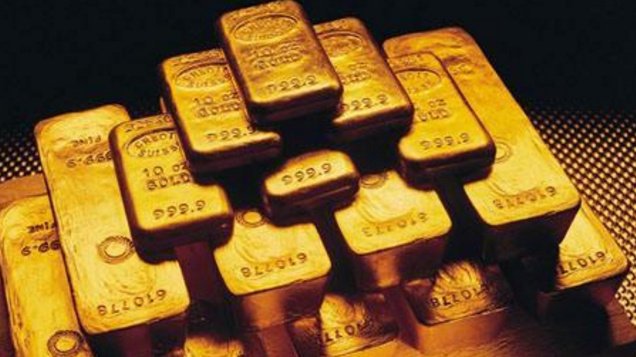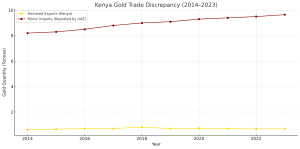Investigations
PHASE I of VIII: Kenya’s Gold Scandal: $1 Billion in Exports Vanish, Linked to War Zones and Smuggling

A bombshell report by Swiss NGO SWISSAID reveals a staggering $1.68 billion gap in Kenya’s gold exports over the past decade, exposing a shadowy network of smuggling, corruption, and ties to conflict zones in Africa.
The findings, based on official trade data and field investigations, paint a damning picture of Kenya’s role as a regional hub for illicit gold flows—fueling violence in war-torn countries like South Sudan and the Democratic Republic of Congo (DRC) while lining the pockets of smugglers and political elites.
The Missing Gold
Kenya officially reported exporting just 672 kg of gold in 2023.
Yet, according to international trade data, other countries—primarily the United Arab Emirates (UAE)—recorded imports of 9.65 tonnes of Kenyan gold the same year. This glaring discrepancy, totaling 51.8 tonnes over a decade, points to a vast underground trade.
“The numbers don’t lie. Kenya is hemorrhaging gold, and it’s being smuggled out on an industrial scale,” said a SWISSAID researcher who spoke on condition of anonymity.
Conflict Gold Pipeline
The report uncovers Kenya’s role as a transit hub for blood gold from conflict zones:
– South Sudan: Gold smuggled through porous borders like Nadapal-Lokichogio, often controlled by Somali traders and South Sudanese warlords.
– DRC: Up to 2.4 tonnes annually of Congolese gold—linked to armed groups—flows into Kenya before being laundered through Nairobi’s Eastleigh district and shipped to Dubai.
– Ethiopia & Sudan: Gold from Oromia and Sudan’s war-ravaged mines is trafficked via Kenya, with recent allegations tying Kenyan officials to Sudan’s Rapid Support Forces (RSF) militia.
“This isn’t just smuggling—it’s war financing,” said a UN sanctions expert. “Every kilo that reaches Dubai bankrolls violence.”
The Dubai Connection
The UAE accounts for 97% of Kenya’s unreported gold exports, with Dubai’s refineries turning a blind eye to dubious origins.
In one brazen 2023 incident, 3 tonnes of Congolese gold vanished from Nairobi’s Jomo Kenyatta International Airport en route to Dubai—a heist insiders say required high-level complicity.
Failed Reforms & Political Complicity
Despite government pledges to formalize artisanal mining and crack down on smuggling, efforts have collapsed due to corruption and weak enforcement. A proposed Gold Processing Bill remains stalled, while a new “gold souk” in Nairobi’s Eastleigh district—touted as a legitimate marketplace—risks becoming another front for laundering illicit metal.
“Politicians are knee-deep in this trade,” a Kenyan mining expert told SWISSAID. “They’ll never kill the golden goose.”
Global Implications
The report urges international action:
– LBMA-certified refiners in Switzerland and South Africa must scrutinize Kenyan gold.
– The UAE must enforce stricter due diligence on imports.
– Kenyan authorities face mounting pressure to prosecute smuggling networks—including those tied to top officials.
As gold prices soar, Kenya’s illicit trade shows no signs of slowing.
For miners in Migori or traders in Eastleigh, the stakes are survival. For warlords and smugglers, it’s pure profit. And for Kenya’s government, it’s a reckoning long overdue.
Read the full SWISSAID report:
Kenya – African Gold ReportFor investigative tips or leaks, contact us.
This story was produced with support from SWISSAID’s African Gold Report. All facts are independently verified.
Kenya Insights allows guest blogging, if you want to be published on Kenya’s most authoritative and accurate blog, have an expose, news TIPS, story angles, human interest stories, drop us an email on [email protected] or via Telegram
-

 Investigations1 week ago
Investigations1 week agoBillions Stolen, Millions Laundered: How Minnesota’s COVID Fraud Exposed Cracks in Somali Remittance Networks
-

 News1 week ago
News1 week agoUS Moves to Seize Luxury Kenya Properties in Sh39 Billion Covid Fraud Scandal
-

 News1 week ago
News1 week agoMAINGA CLINGS TO POWER: Kenya Railways Boss Defies Tenure Expiry Amid Corruption Storm and Court Battles
-

 Investigations1 week ago
Investigations1 week agoJulius Mwale Throws Contractor Under the Bus in Court Amid Mounting Pressure From Indebted Partners
-

 Americas1 week ago
Americas1 week agoUS Govt Audits Cases Of Somali US Citizens For Potential Denaturalization
-

 Business1 day ago
Business1 day agoEastleigh Businessman Accused of Sh296 Million Theft, Money Laundering Scandal
-

 Business1 day ago
Business1 day agoEXPLOSIVE: BBS Mall Owner Wants Gachagua Reprimanded After Linking Him To Money Laundering, Minnesota Fraud
-

 Americas3 days ago
Americas3 days agoTrump Says US Needs Greenland For Its National Security

















